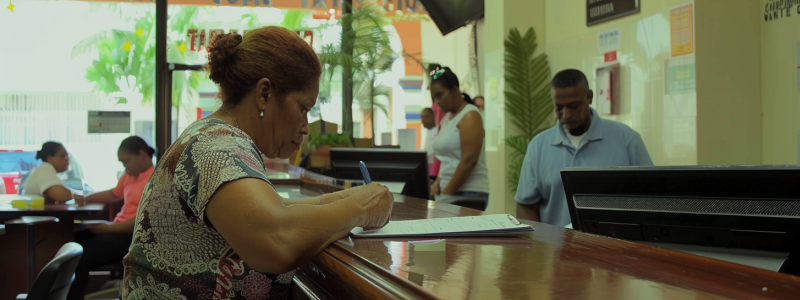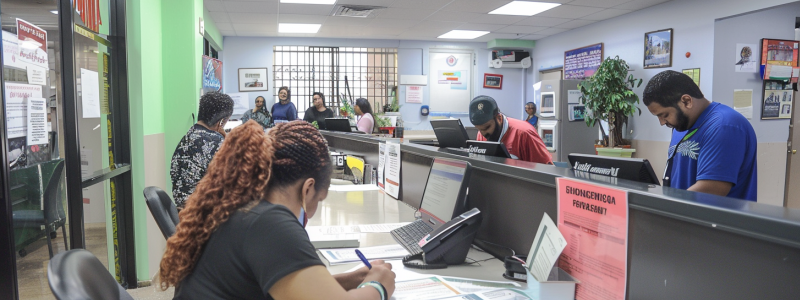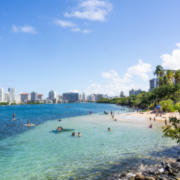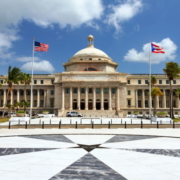Welcome to the world of entrepreneurship in Puerto Rico. You are about to embark on a journey that combines the island’s rich cultural heritage with a thriving business environment. Puerto Rico offers a unique landscape for both local and international entrepreneurs. Whether you’re attracted by the tropical climate, strategic location, or growing economic opportunities, this region has much to offer.
Starting a business in Puerto Rico requires a deep understanding of the local market dynamics, regulatory environment, and cultural nuances. To help you with this, we have created a comprehensive guide titled “How to Start a Business in Puerto Rico.” It is designed to walk you through the essential steps, from initial research and legal procedures to effective marketing strategies, including the powerful realm of billboard advertising. With each step, you will gain insights and practical advice to navigate the complexities of setting up your business in this promising region.
Our goal is to provide you with a friendly yet expert guide that makes the business setup process as smooth and successful as possible. Whether you’re looking to open a quaint café in the heart of San Juan, a boutique resort along the coastline, or a tech startup that leverages local innovations, this guide will equip you with the knowledge you need to start your business journey with confidence. Let’s dive into the details.

Step 1: Conduct Market Research
Embarking on a business venture in Puerto Rico begins with one critical step: market research. Understanding the local consumer behavior, economic trends, and competitive landscape can dramatically increase your chances of success. Here’s how you can start your market research effectively:
- Identify Your Target Market: Define who your customers are. Are they local residents, tourists, or perhaps businesses in a specific sector? Understanding your target audience’s preferences, buying habits, and needs will help tailor your products and services.
- Analyze Industry Trends: Look into the broader industry trends within Puerto Rico. How has the economic climate affected this industry? Are there emerging sectors that might offer opportunities? Resources like the Puerto Rico Trade and Export Company provide insights and statistics that are invaluable.
- Competitive Analysis: Identify your main competitors. What are they doing well? Where could they improve? By analyzing your competition, you can find a niche or service not currently offered that could differentiate your business.
- Customer Surveys and Feedback: If possible, gather feedback directly from potential customers. This can be through online surveys, focus groups, or informal conversations. Their insights will provide a direct line to what your target market desires.
- Utilize Local Resources: Make use of local market research firms and online databases to gather data about your industry. The Puerto Rico Chamber of Commerce and the United States Census Bureau are excellent starting points for demographic and economic data.
By meticulously analyzing the market, you will not only understand where your business fits within the local ecosystem but also gauge potential challenges and opportunities. This foundational knowledge is essential as you move forward with setting up your business in Puerto Rico.
Step 2: Choose the Right Business Structure
Choosing the appropriate business structure is pivotal as it influences everything from your day-to-day operations to tax obligations, and even your personal liability. In Puerto Rico, you have several options to consider, each with its own set of advantages and disadvantages:
- Sole Proprietorship: This is the simplest form of business structure, easy to set up and manage. Ideal for small, low-risk businesses, a sole proprietorship means that the business liabilities are treated as your personal liabilities.
- Partnership: If you’re considering a business with one or more partners, this might be the way to go. There are two types in Puerto Rico: limited partnerships (LP) and general partnerships (GP). While partnerships offer the benefit of shared responsibility, they also require clear agreements to manage risk.
- Corporation (Corp.): A corporation is a more complex structure but provides significant advantages in terms of liability protection and potential tax benefits. In Puerto Rico, corporations are subject to the corporate tax rate and must adhere to stringent regulatory requirements.
- Limited Liability Company (LLC): Combining the benefits of a corporation and a partnership, an LLC in Puerto Rico offers flexibility and protects its members from personal liability. This structure is popular among foreign investors and entrepreneurs due to its protective features and simplicity.
Legal Requirements for Registering Your Business:
- Choose a Business Name: Ensure your business name is unique and register it with the Puerto Rico State Department.
- Register for Permits and Licenses: Depending on your business type, you may need specific permits and licenses to operate legally in Puerto Rico.
- Tax Registrations: Register for the necessary state and federal taxes. You will need an Employer Identification Number (EIN), which can be obtained from the IRS.
Selecting the right business structure is crucial for your long-term success and legal compliance. Each type has specific implications for your liability, tax obligations, and operational flexibility. Carefully consider which structure aligns best with your business goals and consult with a legal expert to navigate the complexities of Puerto Rican law. This careful planning will lay a solid foundation for your business and help avoid significant hurdles in the future.
Step 3: Register Your Business
Registering your business is a fundamental in how to start a Business in Puerto Rico. This process solidifies your presence in the local market and involves several key actions:
Documentation and Registration
- Register Your Business Name: Before you can register your business, you must ensure that your business name is not already in use. Check with the Puerto Rico State Department’s Commercial Registry to see if your desired name is available.
- Obtain an Employer Identification Number (EIN): Essential for all businesses, the EIN is your federal tax ID. You can apply for it through the IRS website. This number is required for tax filings, opening a bank account, and hiring employees.
- File Organization Documents: Depending on your business structure, you will need to file different documents:
- Corporations must file articles of incorporation.
- LLCs file articles of organization.
- Partnerships require a partnership agreement.
Where to File
Documents can be filed online via the Puerto Rico State Department’s portal or in person at their office. It’s important to ensure that all information is accurate to avoid delays.
Cost and Time
- Fees: The cost to register a business in Puerto Rico varies depending on the business structure and the type of filings required. Typically, fees range from $150 to $500.
- Timeframe: The registration process usually takes between 4 to 6 weeks. However, this can vary based on the complexity of your business structure and the completeness of your submitted documents.
Other Legal Considerations
- Licenses and Permits: Identify any specific licenses or permits your business may require based on its activities. Common examples include health department permits for restaurants or environmental permits for construction companies.
- Local Zoning Laws: Check local zoning regulations to ensure that your business location is in an area zoned for your type of business. This is crucial for avoiding future legal complications.
- Annual Reports: Most businesses in Puerto Rico are required to file annual reports with the Puerto Rico State Department. These reports keep your business in good standing and update the state on any significant changes to your business.
Completing these registration steps is not just a legal formality; it also provides your business with credibility and legitimacy in the eyes of customers, suppliers, and financial institutions. Make sure to follow through meticulously to set a strong foundation for your business operations in Puerto Rico.
Step 4: Understand Tax Obligations
Proper management of tax obligations is critical for your business success in Puerto Rico. Familiarizing yourself with local and federal tax requirements will help you avoid legal issues and ensure financial health. Here’s what you need to know about the tax landscape for businesses in Puerto Rico:
Local Tax Responsibilities
- Puerto Rico Sales and Use Tax (IVU): Similar to sales tax, IVU is applicable to most goods and services sold within Puerto Rico. The current standard rate is 11.5%, with a reduced rate for certain items such as unprocessed foods.
- Corporate Income Tax: Companies operating in Puerto Rico are subject to corporate income tax on their earnings. The rate varies depending on your business’s income level but generally ranges from 20% to 30%.
- Municipal Taxes: In addition to state taxes, businesses may also be subject to taxes imposed by the local municipalities. These can include property taxes, business license taxes, and more.
Federal Taxes
- U.S. Federal Income Tax: Despite being a territory, residents and businesses in Puerto Rico generally do not pay U.S. federal income taxes on income sourced within Puerto Rico; however, any income sourced from the U.S. must be declared and could be subject to taxation.
- FICA and Medicare: Businesses are required to contribute to Social Security and Medicare, just as in the mainland United States. This involves withholding the appropriate amounts from employee wages and matching those contributions.
Staying Compliant
- Regular Updates: Tax laws can change, so it’s important to stay informed. Consulting with a tax advisor who is familiar with both Puerto Rican and U.S. tax laws is advisable.
- Filing Deadlines: Be aware of and comply with all filing deadlines to avoid penalties and fines. This includes monthly, quarterly, and annual tax filings, depending on your business activities.
- Record Keeping: Maintain meticulous records of all financial transactions, tax filings, and relevant business activities. Good record keeping not only helps in staying compliant but also in managing your business effectively and preparing for audits.
Understanding and managing your tax obligations is essential for operating a successful business in Puerto Rico. By ensuring compliance with both local and federal tax laws, you protect your business from legal complications and build its reputation as a trustworthy entity.

Step 5: Secure Financing
Securing adequate financing is a crucial step in how to start a Business in Puerto Rico. Whether you need initial startup capital, funds for expansion, or cash to cover operational costs, here are some avenues you can explore to secure the necessary funds:
Types of Financing Available
- Bank Loans: One of the most traditional forms of financing, bank loans can provide significant amounts of capital. You’ll need to present a solid business plan and good credit history to qualify. Local banks in Puerto Rico, such as Banco Popular de Puerto Rico and FirstBank, offer various business loans with competitive terms.
- Government Grants and Subsidies: The Puerto Rican government offers various grants and subsidies through agencies like the Economic Development Bank for Puerto Rico. These are especially targeted at sectors such as technology, agriculture, and tourism.
- Venture Capital: For businesses with high growth potential, particularly in industries like tech, venture capital could be a viable option. Local venture capital firms provide funding in exchange for equity in your company.
- Angel Investors: Angel investors are typically high-net-worth individuals looking to invest in promising business ventures in exchange for equity. Networking in local business events and conferences can be a good way to meet potential investors.
Tips for Successful Financing
- Prepare a Comprehensive Business Plan: This should detail your business idea, market analysis, management structure, and financial projections. A well-prepared business plan is crucial to convince lenders and investors of the viability of your business.
- Understand the Terms of Financing: Whether it’s a loan or an equity investment, understanding the terms of your financing agreement is critical. Pay special attention to interest rates, repayment schedules, equity stakes, and any other obligations.
- Build and Maintain Good Credit: Good personal and business credit scores can significantly increase your chances of securing a loan with favorable terms. Regularly check your credit report and work on improving any negative factors.
- Explore Multiple Options: Don’t limit yourself to one type of financing. Explore various sources to determine which one best suits your business needs and offers the most favorable terms.
Finalizing Your Financial Plan
Once you have identified potential sources of funding, prioritize those that align best with your business goals and financial needs. It might also be beneficial to combine different types of financing to cover various aspects of your business expenses.
Securing the right financing involves careful planning and negotiation but is essential for the health and growth of your business. By exploring all available options and preparing thoroughly, you will significantly increase your chances of securing the necessary funding to launch and expand your business in Puerto Rico successfully.
Step 6: Set Up Your Business Location
Choosing the right location is crucial for the success of your business in Puerto Rico. This decision impacts your operational efficiency, branding, customer traffic, and overall business growth. Here are key considerations when setting up your business location:
Factors to Consider
- Target Market Proximity: Your location should be easily accessible to your target market. Consider the demographics and buying behaviors of the area to ensure alignment with your business offerings.
- Visibility and Accessibility: A location that is visible and easily accessible to foot or vehicle traffic can significantly increase customer visits. Look for areas with good infrastructure, public transportation access, and ample parking.
- Zoning Laws: Ensure the chosen location complies with local zoning laws. These laws determine what types of businesses can operate in certain areas. Check with the local municipality to avoid any legal issues that might arise from non-compliance.
- Competition: Evaluate the competitive landscape of the area. Being too close to competitors can be challenging unless you have a clear differentiation strategy.
- Cost of Real Estate: The cost of leasing or buying a property varies widely across Puerto Rico. Consider your budget and financial forecasts to ensure the location cost is sustainable for your business model.
Steps to Set Up Your Business Location
- Research Potential Locations: Identify several potential locations based on the factors mentioned above. Conduct thorough research, including site visits and discussions with other local business owners.
- Evaluate Lease Agreements or Purchase Terms: Carefully review all terms in lease agreements or purchase contracts. Consider seeking legal advice to understand all obligations and rights.
- Infrastructure Needs: Assess the infrastructure of the potential location. This includes utilities, internet availability, logistics needs, and any modifications required to suit your business operations.
- Obtain Necessary Permits and Licenses: Depending on the location and nature of your business, you may need additional permits and licenses specific to that area. This can include signage permits, health department approvals, or special state licenses.
- Plan Your Layout and Design: The layout and design of your business should not only reflect your brand but also optimize operational efficiency. Plan for customer flow, employee workspaces, and storage needs.
Finalizing Your Location
Once you have finalized your location, take the time to announce your arrival in the community. This can involve an opening ceremony, special promotions, or community events to generate buzz and build relationships with local residents and other businesses.
Choosing the right location is a strategic decision that requires careful planning and consideration. By taking into account these key factors and following the steps outlined, you can establish a business location in Puerto Rico that supports your company’s growth and market penetration objectives.
Step 7: Marketing Your Business
Effective marketing is crucial for any business aiming to succeed, especially in the competitive landscape of Puerto Rico. While various marketing strategies can elevate your brand, incorporating billboard advertising into your marketing mix can significantly enhance your visibility and customer engagement. Here, we emphasize the unparalleled benefits of billboard advertising, specifically through a leading company in the sector, bMedia.
General Marketing Strategies
- Develop a Strong Brand Identity: Establish a recognizable brand identity that reflects your business ethos and appeals to your target audience. This includes having a compelling logo, consistent themes, and a coherent message that resonates with your customers.
- Leverage Digital Marketing: Use digital platforms effectively—optimize your website for SEO, engage on social media, and send out targeted emails. These methods help broaden your reach and interact directly with potential customers.
- Local Media Engagement: Gain local media exposure by featuring in Puerto Rican newspapers, radio, and TV channels. This traditional form of media still holds significant sway and can boost your reputation within local communities.
- Community Involvement: Increase your local presence by participating in or sponsoring community events. This not only enhances visibility but also helps in fostering community relationships, crucial for business growth.
Advertising with bMedia: Benefits
- Strategic High-Traffic Locations: bMedia offers premium billboard placements in some of the most frequented areas across Puerto Rico, ensuring your advertisements get maximum exposure to your target demographic.
- Consistent Brand Exposure: Billboards capture the attention of a wide audience repeatedly, which is vital for brand recall. With bMedia’s strategically located billboards, your business gains continuous exposure, helping to keep you top-of-mind among potential customers.
- Tailored Advertising Solutions: bMedia specializes in creating tailored advertising solutions that resonate with specific audiences. This personalized approach ensures that your marketing message is not only seen but also impactful.
Tips for Effective Billboard Advertising
- Choosing the Right Locations: With bMedia’s extensive network, select locations that best meet your demographic needs for optimal visibility and impact.
- Designing Impactful Billboards: Collaborate with bMedia’s experienced designers to create visually striking and memorable billboards. An effective billboard is visually appealing and delivers its message clearly and quickly to those on the move.
- Regular Campaign Evaluations: bMedia provides valuable analytics on the performance of your billboards, allowing you to measure effectiveness and make informed adjustments to your marketing strategy.
Cost-Effective Advertising
- Transparent Pricing: bMedia offers competitive pricing models that cater to various budget sizes, ensuring that you can benefit from high-quality billboard advertising without compromising other marketing initiatives.
- Measurable Returns: Track the success of your billboard campaigns with bMedia’s advanced tracking tools. This data helps you understand your return on investment and refine your strategies for even better results.

A Final Word
Integrating billboard advertising into your marketing strategy can significantly increase your business’s market presence in Puerto Rico. By partnering with bMedia, you leverage their expertise, strategic placement, and customized advertising solutions to not only reach but also resonate with your target audience. Remember, successful marketing is about making lasting impressions and building relationships—bMedia’s billboard advertising can help you achieve just that. Let your brand be seen and remembered with bMedia.










 787 792 4113
787 792 4113
